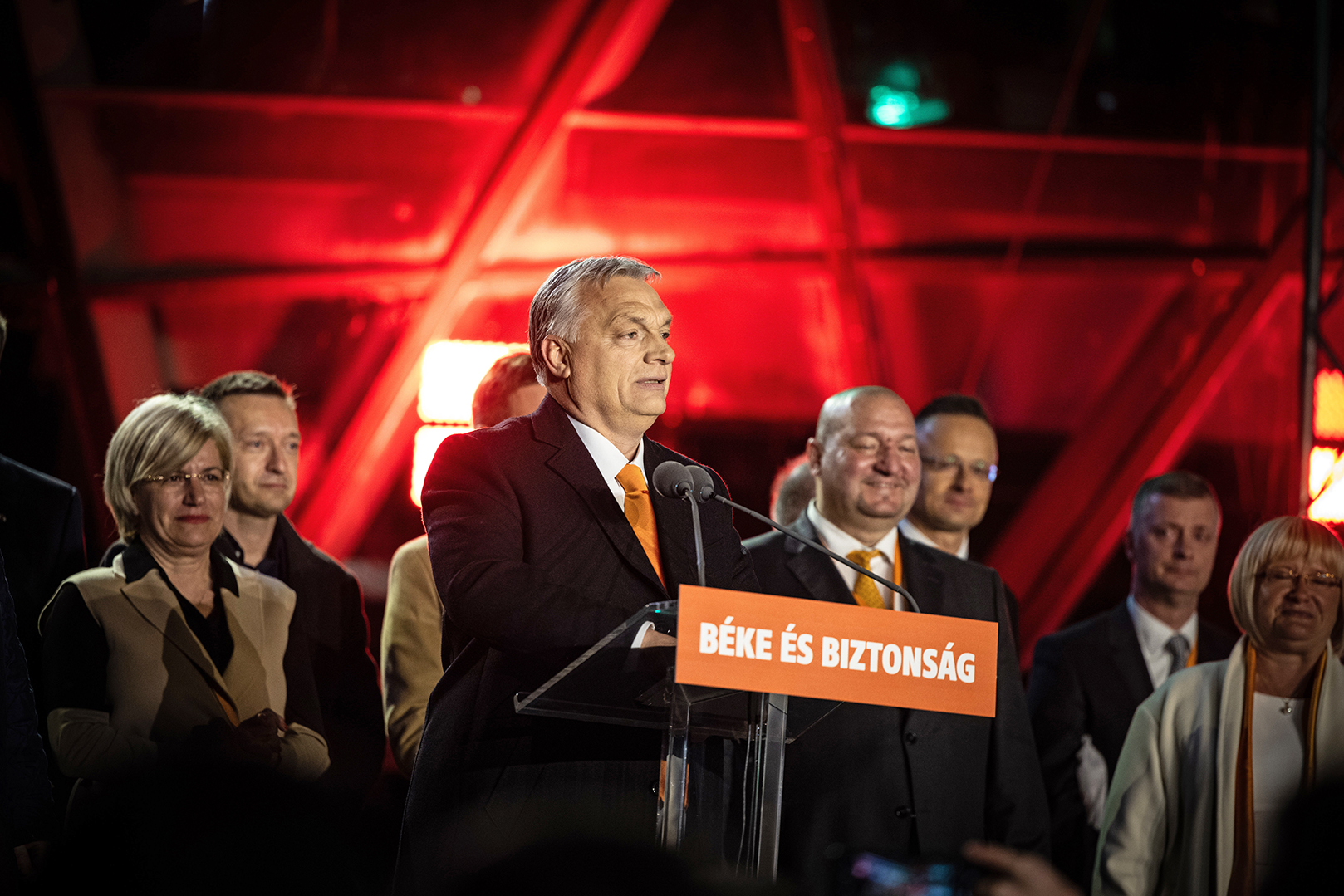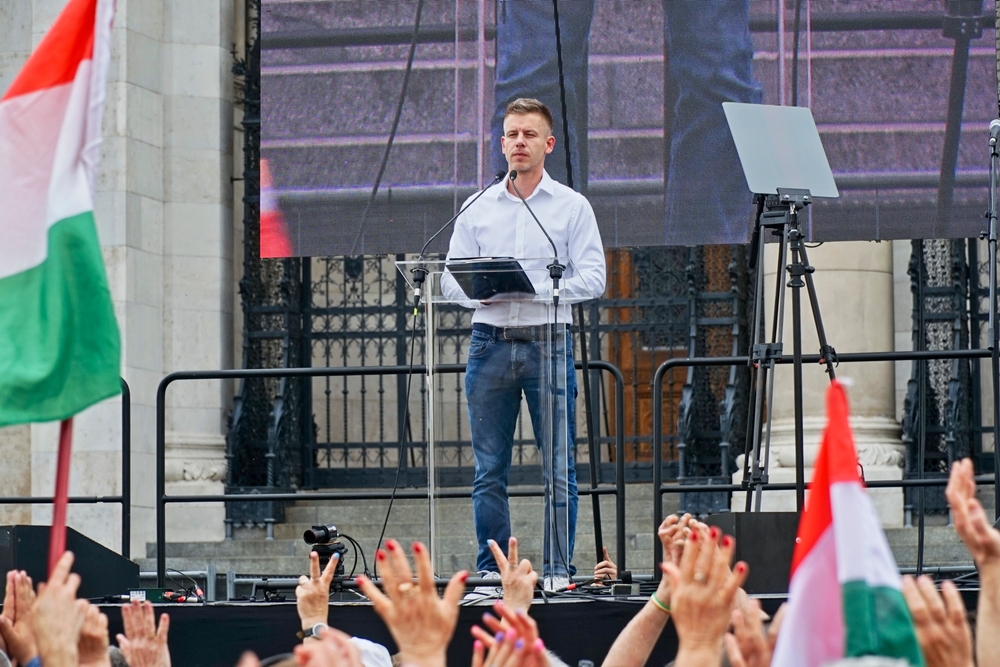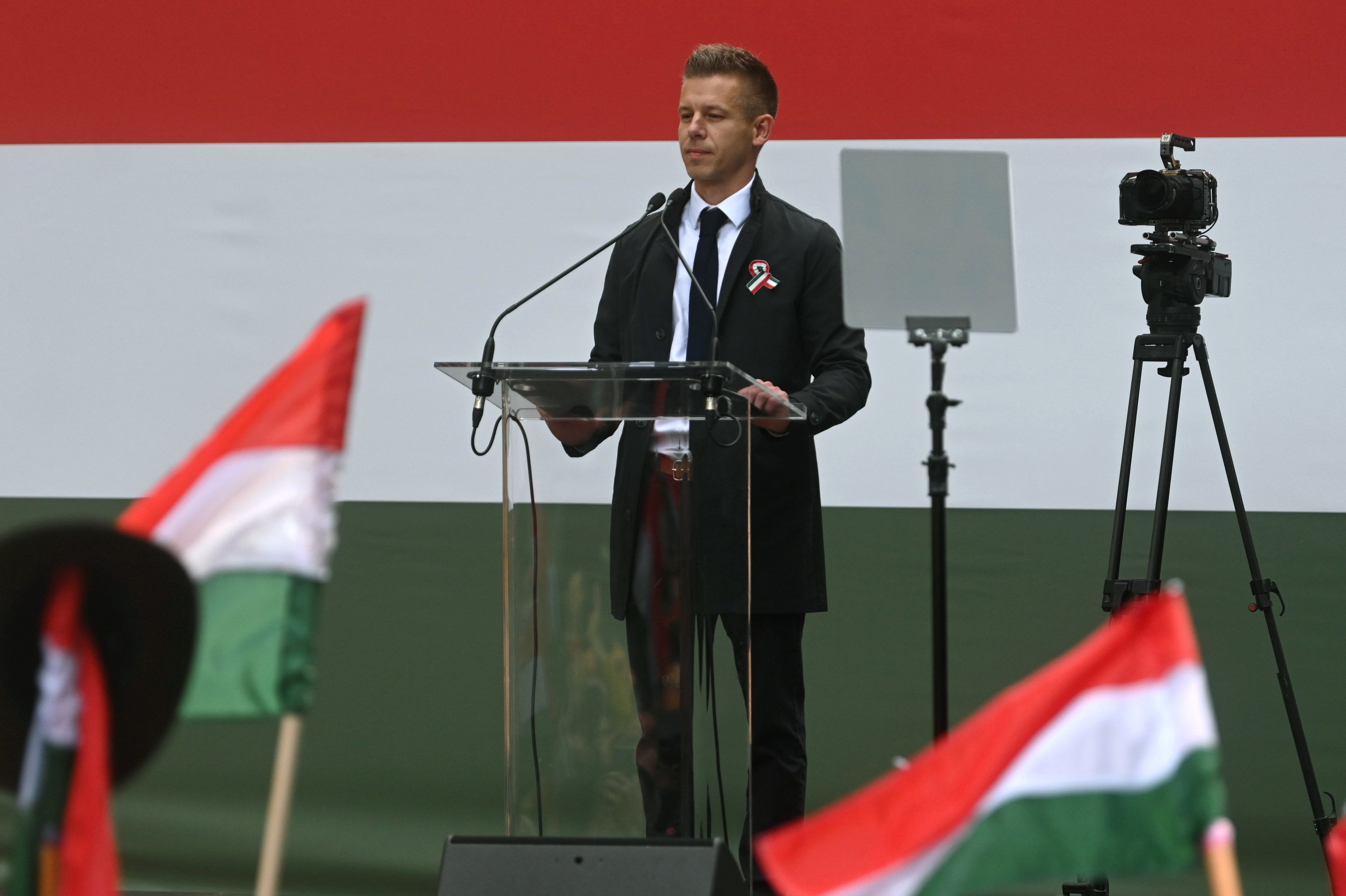Orbán’s Fidesz-KDNP Steamrollers to 4th Consecutive Supermajority

Prime Minister Viktor Orbán, President of Fidesz, delivers a victory speech to the Fidesz-KDNP faithful at the Bálna building on April 3, flanked by key party allies.
Photo by Zoltán Fischer / MTI / Prime Minister’s Press Office.
Hungary’s governing coalition, led by incumbent Prime Minister Viktor Orbán, won an overwhelming victory in parliamentary elections held on April 3, out-performing even the most optimistic analysts’ projections to win a fourth consecutive constitutional supermajority in the next parliament.
With nearly 99% of the vote counted, Fidesz – whose Christian Democrat People’s Party (KDNP) partner is generally seen as a satellite party – routed the opposition, winning a record 53% of the vote and ready to claim 88 out of the crucial 106 individual constituencies. With 47 seats from the party list, Fidesz won 135 of the 199 MP seats, leading to a resounding 67.8% majority in the house. Voter turnout was 69.5%
As expected, the united opposition dominated the capital, winning 16 of Budapest’s 18 constituencies, but performed miserably in the provinces, with victory in just two more individual constituencies, in the southern cities of Pécs and Szeged. Péter Márki-Zay, the opposition alliance prime ministerial candidate, lost to Fidesz heavyweight János Lázár in his home town of Hódmezővásárhely.
The six-party United for Hungary alliance garnered 56 MPs, a mere 28.1% of parliament. Mi Hazánk (Our Homeland), the radical right remnant of Jobbik, also surprised analysts’ projections to win 6.2% of the vote, giving them seven MPs, with the remaining seat awarded to the ethnic German grouping.
“We have won an enormous victory, so big that it can be seen from the moon, certainly from Brussels,” the prime minister joked in his post-election speech to chanting supporters. Thanking all who turned out in support, he paid particular attention to “Hungarians watching from across the border” for their assistance, singling out ethnic kin in Ukraine with encouragement that “the motherland is with them.”
The prime minister described his victory as a right-wing triumph against a powerful coalition of international, left-liberal forces ranging from Brussels and media groups to President Volodymyr Zelensky of Ukraine. (The OSCE found the election was “marred” by several faults, including a blurred line between state and party and media bias. See “OSCE: Elections Well run, but Undermined by ‘Absence of Level Playing Field.’”)
More of the Same?
By the print deadline for this paper, Orbán had still not released any details of his next cabinet or its plans. Given the size of his victory and indications from his post-election address, he is expected to continue with a similar administration and right-wing, nationalist policies.
Post-election, analysts concluded that Fidesz had exploited fears over the war in Ukraine. The prime minister’s focus on “peace” and keeping Hungary out of the war had resonated with many voters.
In addition, although the leaders of the six parties were able to work together effectively, Jobbik’s former voters failed to rally behind their guidance, many either voting for Fidesz or remaining with the splinter radical-right members who formed the Our Homeland party, according to an analysis by Political Capital, a Budapest-based think tank.
“It seems that it was an illusion to suppose that the majority of Jobbik’s 2018 electorate [comprising 1.1 million voters] would be willing to support the opposition cooperation. The majority of them could have ended up voting for Fidesz or Mi Hazánk,” the analysis concluded. (See “A ‘United’ Opposition Found Ultimately Divided.”)
Furthermore, Political Capital argues that Márki-Zay “paralyzed” the campaign when he demanded a seventh parliamentary group after the election, appearing as a rival to his six party allies.
“This quickly made everyone forget the success of the primaries, and the results indicate that this even confused opposition voters,” the think tank reasoned. In post-election comments, Márki-Zay implied he would not take up his parliamentary seat but continue in his role as mayor of Hódmezővásárhely, in southeast Hungary.
OSCE: Elections Well run, but Undermined by ‘Absence of Level Playing Field’
Hungary’s parliamentary elections offered voters distinct alternatives and were well run, but while competitive, the process was marred by the pervasive overlapping of government and ruling coalition’s messaging that blurred the line between state and party, as well as by media bias and opaque campaign funding, the Organization for Cooperation and Security in Europe (OSCE) declared at a press conference on April 4.
The OSCE, most unusually for an election in a member state of the European Union, had sent a full observer mission, comprising 312 persons in total, to monitor the Hungarian elections.
The mission found that while the legal framework formed an adequate basis to run democratic elections, what it termed “a number of key aspects fall short of international standards,” noting that “the secrecy of the vote was often compromised, particularly in overcrowded polling stations.”
The mission stated that Hungary’s media is sharply divided in an increasingly concentrated market.
“Ahead of the elections, biased and unbalanced news coverage permeated the public and many private media outlets, mostly to the benefit of the ruling party,” observers concluded. The OECD emphasized that voters’ ability to make an informed choice was, in addition, limited by “the absence of debate between the main contestants.”
Jillian Stirk, head of the observation mission, said, “Numerous shortcomings already became clear in the period running up to the vote, from the biased media through to the all-pervasive linkage of state and party.”
She added, perhaps optimistically, “I very much hope that the government takes the opportunity offered by the presence of our observation team to work towards improving the democratic process for the future of all citizens.”
The government’s International Communications Office, apparently oblivious to most of the OSCE’s critical remarks, issued a statement headlined “Case Closed: OSCE Takes no Real Issue With the Elections.”
However, it continued, somewhat incongruously, by reasoning that “the fact that OSCE experts take issue with the absence of a level playing field,” media bias, and “an opacity of campaign funding” can be considered business as usual,” adding sarcastically: “We couldn’t have possibly expected them to go down without putting up at least a little fight.”
The office asked: But what if OSCE has been looking for election and campaign fraud in the wrong place this entire time? Maybe they should have looked at what it termed “the shady financiers” behind Márki-Zay’s text messaging campaign “based on illicitly obtained personal information,” something the OSCE relegated to a mere footnote in their report.
A ‘United’ Opposition Found Ultimately Divided
Despite the initial, perceived success in forming a six-party opposition alliance, it had to battle with alternative parties, which gained ground among voters disaffected with both the government and the official opposition coalition.
As a result, even in districts thought to be reasonably safe opposition seats, the effect was to split the “greater opposition” vote, render the alliance ineffective and enable Fidesz victories. In this respect, the spoof Two-Tailed Dog Party and the radical-right Our Homeland played crucial roles, the latter in particular by retaining former Jobbik voters.
Take, for example, Budakeszi, a district just to the west of Budapest where the alliance candidate was the popular local green campaigner, Bernadett Szél. Though she attracted in excess of 31,200 votes, she lost to Fidesz’ Tamás Menczer, who triumphed with 33,615 ballots, or 47.5% of the active electorate.
But in the same race, Our Homeland and the Two-Tailed Dog together garnered 4,900 votes. Without their participation, Szél would have defeated her opponent had she attracted just 50% of those anti-government votes.
This article was first published in the Budapest Business Journal print issue of April 8, 2022.
SUPPORT THE BUDAPEST BUSINESS JOURNAL
Producing journalism that is worthy of the name is a costly business. For 27 years, the publishers, editors and reporters of the Budapest Business Journal have striven to bring you business news that works, information that you can trust, that is factual, accurate and presented without fear or favor.
Newspaper organizations across the globe have struggled to find a business model that allows them to continue to excel, without compromising their ability to perform. Most recently, some have experimented with the idea of involving their most important stakeholders, their readers.
We would like to offer that same opportunity to our readers. We would like to invite you to help us deliver the quality business journalism you require. Hit our Support the BBJ button and you can choose the how much and how often you send us your contributions.








